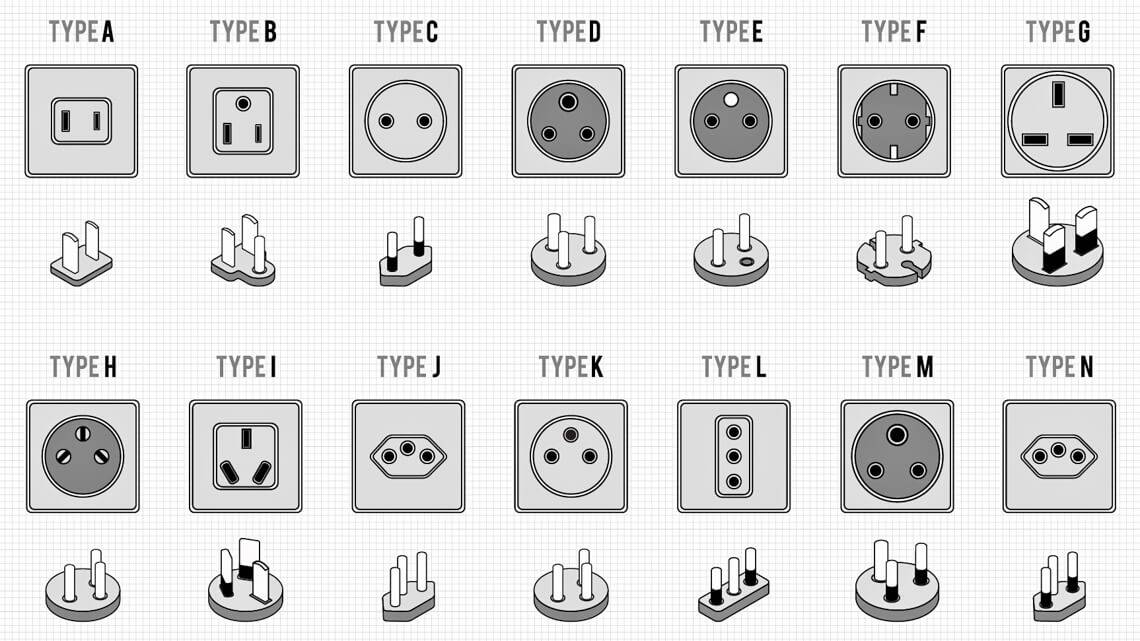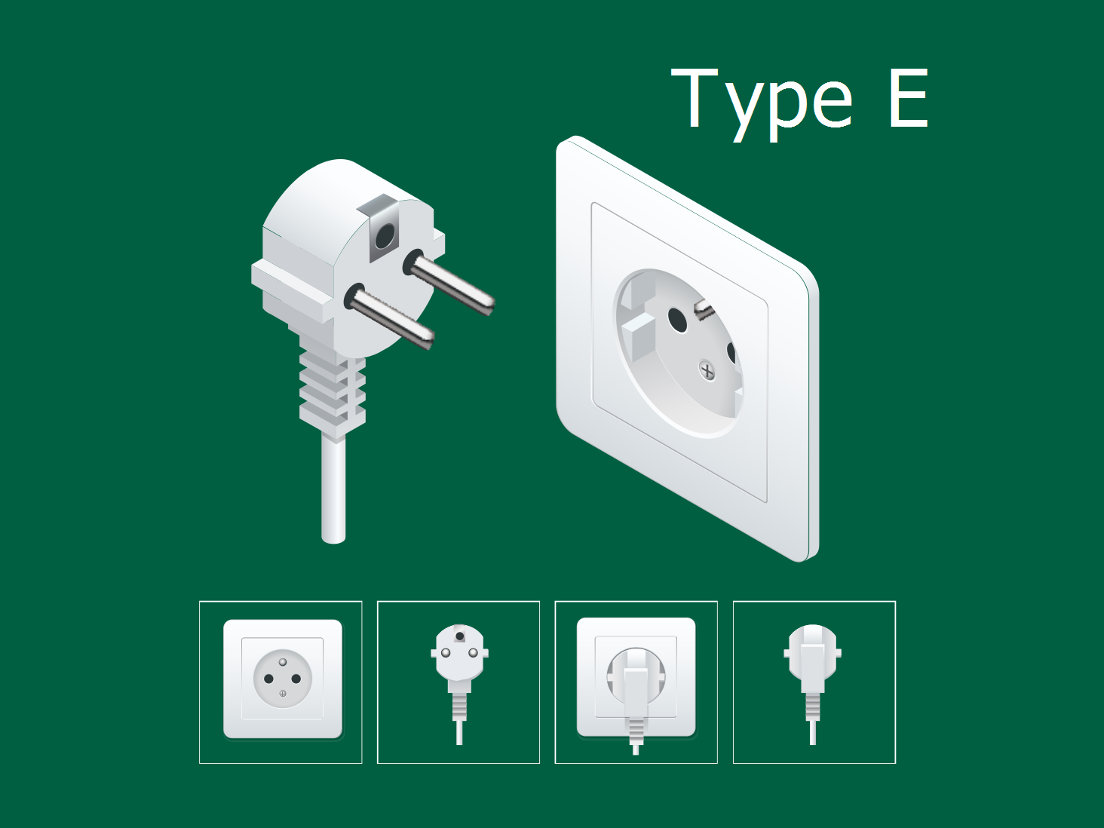France uses Type C and Type E plugs. These plugs operate at a standard voltage of 230V and a frequency of 50Hz.
Traveling to France necessitates knowing the type of electrical plugs and outlets used there. Type C plugs have two round pins and are common in many European countries. Type E plugs also feature two round pins but include a grounding pin.
Compatibility with these plugs ensures that your electronic devices function properly. Always check the voltage and frequency requirements for your devices to avoid any potential damage. Investing in a universal adapter can be beneficial for frequent travelers. These adapters make it convenient to connect your gadgets without any hassle. Understanding these details helps ensure a smooth and stress-free travel experience.

Credit: www.parisdiscoveryguide.com
Types Of Plugs
France uses different types of plugs for electrical devices. Knowing the right plug type is crucial for travelers. This guide will help you understand the different types of plugs used in France.
Europlug
The Europlug is common in many European countries. It’s often used for devices with low power consumption.
Key features of the Europlug include:
- Two round pins spaced 19mm apart.
- Designed for devices that need up to 2.5 amps.
- Works with voltage ranges of 220-240V.
The Europlug is flexible and can fit into different types of sockets. This makes it a popular choice for many small appliances. You will find it on devices like:
- Phone chargers
- Electric toothbrushes
- Shavers
While the Europlug is handy, it is not suitable for high-power devices. Always check your device’s power needs before using it with a Europlug.
Type C Plug
The Type C plug is another common plug in France. It is similar to the Europlug but has a few differences.
Key features of the Type C plug include:
- Two round pins spaced 19mm apart, like the Europlug.
- Handles devices up to 2.5 amps.
- Works with a voltage range of 220-240V.
One main difference is that Type C plugs are ungrounded. This means they do not have an earth pin. The Type C plug is often used for:
- Lamps
- Radios
- Small kitchen appliances
Like the Europlug, the Type C plug is not suitable for high-power devices. Always check your device’s power needs before using it with a Type C plug.
Type E Plug
The Type E plug is more robust and is the standard plug in France. It is used for devices that need grounding.
Key features of the Type E plug include:
- Two round pins spaced 19mm apart.
- Handles devices up to 16 amps.
- Works with a voltage range of 220-240V.
- Includes a grounding pin for safety.
The grounding pin is located in the socket. This pin makes the Type E plug unique. It is commonly used for:
- Refrigerators
- Washing machines
- Ovens
The Type E plug ensures safety for high-power devices. Always use the correct plug type for your appliances to avoid any electrical issues.
Voltage And Frequency
Traveling to France means you need to know about the electrical systems in the country. Understanding the voltage and frequency used in France is crucial for safely using your electronic devices. This section will provide detailed insights into the standard voltage and frequency details in France, ensuring you are well-prepared for your trip.
Standard Voltage
The standard voltage in France is 230 volts. This voltage is common across many European countries, making it easier for travelers to use their devices without issues. Here are some key points to consider:
- Most modern devices are designed to handle 230 volts.
- You might need a voltage converter if your device is rated for a different voltage.
- Check the voltage rating on your device before plugging it in.
For a quick reference, here’s a table summarizing the voltage information:
| Country | Standard Voltage |
|---|---|
| France | 230V |
| USA | 120V |
| Japan | 100V |
Frequency Details
In France, the frequency of the electrical current is 50 Hz. This is important to know because some devices are sensitive to frequency changes. Here are a few points to keep in mind:
- Most European countries use 50 Hz.
- Devices from countries using 60 Hz may not work properly.
- Check the frequency rating on your devices.
Here’s a table for a quick comparison of frequency standards:
| Country | Frequency |
|---|---|
| France | 50 Hz |
| USA | 60 Hz |
| Japan | 50/60 Hz |
Understanding these details ensures you can safely use your electronics in France. Always check your device’s specifications to avoid any potential damage.
Travel Adapters
Traveling to France involves planning for various essentials, including your power needs. The electrical outlets in France may differ from those in your home country. Using the right travel adapter ensures your devices stay charged and ready for use. This guide helps you understand the types of plugs used in France and how to choose the best travel adapter.
Choosing The Right Adapter
France uses Type C and Type E electrical outlets. Both types have two round pins. Type C outlets are common in Europe, while Type E outlets are unique to France and Belgium. Ensure your travel adapter supports these types. Look for adapters labeled “Type C/E” or “Europlug”.
Consider these factors when choosing an adapter:
- Compatibility: Check if the adapter works with Type C and E plugs.
- Voltage: France uses 230V and 50Hz. Ensure your devices can handle this voltage.
- USB Ports: Some adapters include USB ports, which are handy for charging multiple devices.
- Quality: Choose reputable brands to avoid malfunction or fire hazards.
Here’s a table summarizing the key points:
| Feature | Details |
|---|---|
| Plug Type | Type C, Type E |
| Voltage | 230V, 50Hz |
| USB Ports | Optional |
| Quality | Choose reputable brands |
Popular Brands
Several brands offer reliable travel adapters for France. Here are some popular options:
- Bestek: Known for quality and durability. Their adapters often include multiple USB ports.
- Ceptics: Offers a wide range of adapters compatible with different plug types. Their products are compact and easy to carry.
- Skross: Provides high-quality universal adapters. They are versatile and work in many countries.
- EPICKA: Offers multifunctional travel adapters. Their products include USB-C ports for modern devices.
- Travel Ready: Known for affordable and reliable adapters. Their products are simple and efficient.
Choosing a trusted brand ensures your devices stay safe. Quality adapters protect against power surges and prevent damage to your electronics. Opt for brands with positive reviews and good customer support.
Credit: www.electricalsafetyfirst.org.uk
Safety Standards
Traveling to France? You need to know about the plug types used there. Understanding the safety standards is crucial. France uses a specific type of plug, and knowing the safety standards ensures you stay safe and compliant with local regulations.
Regulatory Bodies
Several regulatory bodies in France oversee electrical safety. The main authority is the French National Committee for Electrical Safety (CNSE). CNSE ensures that all electrical products meet strict safety standards. This includes plugs and sockets.
Another key body is the Union Technique de l’Electricité (UTE). UTE develops safety guidelines and standards for electrical installations. They work closely with CNSE to ensure a high level of safety.
These regulatory bodies focus on several areas:
- Product Certification: Ensuring all electrical products are certified before use.
- Safety Inspections: Regular inspections to maintain safety standards.
- Public Awareness: Educating the public on safe electrical practices.
The European Committee for Electrotechnical Standardization (CENELEC) also plays a role. CENELEC sets harmonized standards across Europe, including France. This ensures compatibility and safety of electrical products across member countries.
In summary, these regulatory bodies ensure that electrical products, including plugs, are safe to use in France. They establish guidelines, conduct inspections, and certify products to protect consumers.
Compliance Requirements
To use electrical products in France, compliance with safety standards is mandatory. Products must meet specific requirements to be certified.
First, manufacturers must follow the Low Voltage Directive (LVD). This directive sets safety standards for electrical equipment. It covers design, production, and testing of products.
Second, products must have the CE mark. The CE mark shows that the product meets EU safety, health, and environmental requirements. It is a legal requirement for electrical products in France.
Compliance also involves regular testing and inspections. Certified laboratories conduct these tests to ensure products meet safety standards. The tests include:
- Electrical Safety Tests: Checking for proper insulation and grounding.
- Mechanical Safety Tests: Ensuring the product can withstand physical stress.
- Thermal Safety Tests: Verifying the product does not overheat.
Manufacturers must keep detailed documentation. This includes test results, production records, and compliance certificates. This documentation is essential for proving compliance during inspections.
In conclusion, meeting compliance requirements ensures safety and legal use of electrical products in France. Understanding these requirements helps consumers and manufacturers maintain high safety standards.
Using Multiple Devices
Traveling to France with your gadgets can be tricky. Understanding the plug type and managing multiple devices is crucial for a smooth experience. France uses a unique plug system, and it’s important to know how to adapt your devices accordingly.
Power Strips
Using multiple devices in France can be a challenge without proper preparation. French outlets use the Type C and Type E plugs, operating at 230V and 50Hz. A smart solution is to bring a power strip with you. This allows you to plug in multiple devices using a single adapter. Here are some key points to consider:
- Check Voltage Compatibility: Ensure your power strip can handle 230V.
- Surge Protection: Opt for a power strip with surge protection to safeguard your electronics.
- Plug Type: Choose a power strip with a universal plug or a Type C/E plug adapter.
By using a power strip, you can charge your phone, laptop, and other devices simultaneously. This is especially useful in hotel rooms with limited outlets.
| Feature | Importance |
|---|---|
| Voltage Compatibility | High |
| Surge Protection | Medium |
| Plug Type | High |
Device Compatibility
Not all devices are compatible with the voltage and plug type in France. Here are steps to ensure your devices work:
- Check Voltage Rating: Look at the label on your device. It should indicate if it can handle 230V.
- Use a Voltage Converter: If your device is not compatible, use a voltage converter.
- Adapt Plug Type: Use an adapter to fit the Type C or Type E outlets.
Some modern devices like laptops and smartphones are designed to handle a range of voltages. Always check before plugging in to avoid damage. Here’s a quick reference:
| Device | Voltage Range | Adapter Needed |
|---|---|---|
| Laptop | 100-240V | Yes |
| Smartphone | 100-240V | Yes |
| Hair Dryer | 110-120V | Yes, with converter |
By ensuring your devices are compatible, you can avoid mishaps and enjoy your stay in France without interruptions.

Credit: www.netio-products.com
Frequently Asked Questions
What Kind Of Plug Adapter Do I Need For France?
You need a Type C or Type E plug adapter for France. Both types fit French sockets. Voltage is 230V.
Do France And England Use The Same Plugs?
No, France and England use different plugs. France uses Type C and E plugs. England uses Type G plugs. Travelers need adaptors.
Are Type C And F Plugs Interchangeable?
Type C and F plugs are partially interchangeable. Type C plugs fit into Type F sockets. Type F plugs don’t always fit into Type C sockets.
Can I Charge My Iphone In France?
Yes, you can charge your iPhone in France. Use a plug adapter for the European socket. Ensure your charger supports 220-240V.
Conclusion
Understanding the type of plug used in France is essential for travelers. Always pack the correct adapter for Type C and E plugs. This ensures your devices stay charged and ready. Enjoy a hassle-free trip by preparing ahead. Remember, preparation is key for a smooth and enjoyable journey to France.



Leave a reply